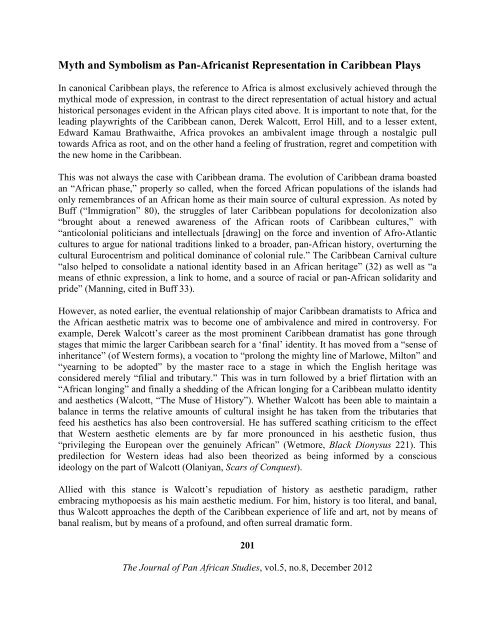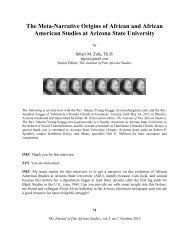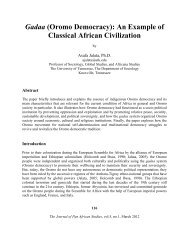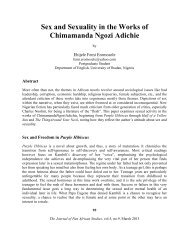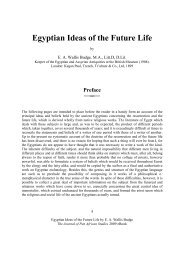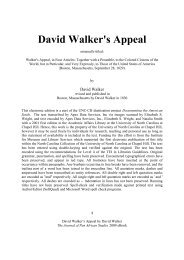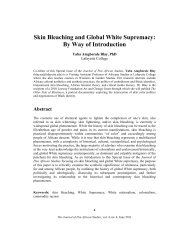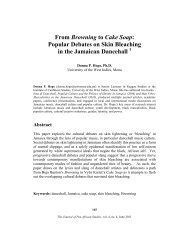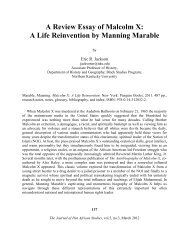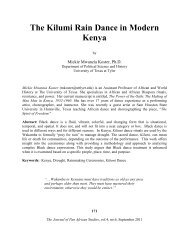view PDF - Journal of Pan African Studies
view PDF - Journal of Pan African Studies
view PDF - Journal of Pan African Studies
Create successful ePaper yourself
Turn your PDF publications into a flip-book with our unique Google optimized e-Paper software.
Myth and Symbolism as <strong>Pan</strong>-<strong>African</strong>ist Representation in Caribbean Plays<br />
In canonical Caribbean plays, the reference to Africa is almost exclusively achieved through the<br />
mythical mode <strong>of</strong> expression, in contrast to the direct representation <strong>of</strong> actual history and actual<br />
historical personages evident in the <strong>African</strong> plays cited above. It is important to note that, for the<br />
leading playwrights <strong>of</strong> the Caribbean canon, Derek Walcott, Errol Hill, and to a lesser extent,<br />
Edward Kamau Brathwaithe, Africa provokes an ambivalent image through a nostalgic pull<br />
towards Africa as root, and on the other hand a feeling <strong>of</strong> frustration, regret and competition with<br />
the new home in the Caribbean.<br />
This was not always the case with Caribbean drama. The evolution <strong>of</strong> Caribbean drama boasted<br />
an “<strong>African</strong> phase,” properly so called, when the forced <strong>African</strong> populations <strong>of</strong> the islands had<br />
only remembrances <strong>of</strong> an <strong>African</strong> home as their main source <strong>of</strong> cultural expression. As noted by<br />
Buff (“Immigration” 80), the struggles <strong>of</strong> later Caribbean populations for decolonization also<br />
“brought about a renewed awareness <strong>of</strong> the <strong>African</strong> roots <strong>of</strong> Caribbean cultures,” with<br />
“anticolonial politicians and intellectuals [drawing] on the force and invention <strong>of</strong> Afro-Atlantic<br />
cultures to argue for national traditions linked to a broader, pan-<strong>African</strong> history, overturning the<br />
cultural Eurocentrism and political dominance <strong>of</strong> colonial rule.” The Caribbean Carnival culture<br />
“also helped to consolidate a national identity based in an <strong>African</strong> heritage” (32) as well as “a<br />
means <strong>of</strong> ethnic expression, a link to home, and a source <strong>of</strong> racial or pan-<strong>African</strong> solidarity and<br />
pride” (Manning, cited in Buff 33).<br />
However, as noted earlier, the eventual relationship <strong>of</strong> major Caribbean dramatists to Africa and<br />
the <strong>African</strong> aesthetic matrix was to become one <strong>of</strong> ambivalence and mired in controversy. For<br />
example, Derek Walcott’s career as the most prominent Caribbean dramatist has gone through<br />
stages that mimic the larger Caribbean search for a ‘final’ identity. It has moved from a “sense <strong>of</strong><br />
inheritance” (<strong>of</strong> Western forms), a vocation to “prolong the mighty line <strong>of</strong> Marlowe, Milton” and<br />
“yearning to be adopted” by the master race to a stage in which the English heritage was<br />
considered merely “filial and tributary.” This was in turn followed by a brief flirtation with an<br />
“<strong>African</strong> longing” and finally a shedding <strong>of</strong> the <strong>African</strong> longing for a Caribbean mulatto identity<br />
and aesthetics (Walcott, “The Muse <strong>of</strong> History”). Whether Walcott has been able to maintain a<br />
balance in terms the relative amounts <strong>of</strong> cultural insight he has taken from the tributaries that<br />
feed his aesthetics has also been controversial. He has suffered scathing criticism to the effect<br />
that Western aesthetic elements are by far more pronounced in his aesthetic fusion, thus<br />
“privileging the European over the genuinely <strong>African</strong>” (Wetmore, Black Dionysus 221). This<br />
predilection for Western ideas had also been theorized as being informed by a conscious<br />
ideology on the part <strong>of</strong> Walcott (Olaniyan, Scars <strong>of</strong> Conquest).<br />
Allied with this stance is Walcott’s repudiation <strong>of</strong> history as aesthetic paradigm, rather<br />
embracing mythopoesis as his main aesthetic medium. For him, history is too literal, and banal,<br />
thus Walcott approaches the depth <strong>of</strong> the Caribbean experience <strong>of</strong> life and art, not by means <strong>of</strong><br />
banal realism, but by means <strong>of</strong> a pr<strong>of</strong>ound, and <strong>of</strong>ten surreal dramatic form.<br />
201<br />
The <strong>Journal</strong> <strong>of</strong> <strong>Pan</strong> <strong>African</strong> <strong>Studies</strong>, vol.5, no.8, December 2012


